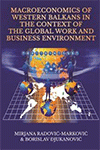
Macroeconomics of Western Balkans in the Context of the Global Work and Business Environment
By:
Mirjana Radović-Marković, Business Academy University
Borislav Đjukanović, University of Donja Gorica
Published 2022
In recent years, there has been an increase in new forms of employment. Namely, thanks to the use of platforms in business and the emergence of the "gig economy", there are gradual changes in this domain. These include part-time, temporary, informal, and unpaid family work. This type of employment can be defined as any job, but only of short or uncertain duration.
The experiences gained by the countries of the European Union, as well as the countries of the Western Balkans from the COVID-19 crisis, during which they used new technologies in work, should in the future make working systems even more adapted to the digital age.
At last, whether working from home is the product of one's own choice or is the result of a pandemic or other environmental shock, the change in the way work is done is real and governments must understand the implications and take steps to position their economies accordingly.
CONTENTS
Preface. PART I: THE MACROECONOMIC ENVIRONMENT IN THE WESTERN BALKANS COUNTRIES CHAPTER 1: Macroeconomic Environment. CHAPTER 2: Inclusion in Global Business Flows. CHAPTER 3: COVID 19 and Remote Work in Western Balkans: Economic Impact Assessment. PART II: SOCIOPSYCHOLOGICAL ASPECTS OF NEW MODALITIES OF WORK CHAPTER 4: COVID-19 and Remote Work in Western Balkans: Sociopsychological Impact. References. Appendix I: Questionnaire for the Economic Part: Doing Business From Home by Countries (Montenegro, B&H, Serbia, and North Macedonia). Appendix II: Questionnaire for the Economic Part: Employment in the “Gig Economy” in Montenegro. Appendix III: Questionnaire for the Sociopsychological Part: Working From Home by Countries (Montenegro, B&H, Serbia, and North Macedonia)
-
Paperback978-1-64802-914-1
Web price: $45.04 (Reg. 52.99)
-
Hardcover978-1-64802-915-8
Web price: $80.74 (Reg. 94.99)
- eBook978-1-64802-916-5

- BUS039000 - BUSINESS & ECONOMICS: ECONOMICS: Macroeconomics
- BUS113000 - BUSINESS & ECONOMICS: Globalization
- PSY031000 - PSYCHOLOGY: Social Psychology
-
 Behavioral Science in the Global Arena
Global Health Trends and Issues
Behavioral Science in the Global Arena
Global Health Trends and Issues
-
 Digital Developments
Perspectives in Psychology
Digital Developments
Perspectives in Psychology
-
 Home in Transition
The Cultural Construction of Heimat
Home in Transition
The Cultural Construction of Heimat
-
 Intimacy
The Shared Part of Me
Intimacy
The Shared Part of Me
-
 Real Talk
Promoting Social Justice in Education and Psychology Through Difficult Dialogues
Real Talk
Promoting Social Justice in Education and Psychology Through Difficult Dialogues
-
 Ten Years of Idiographic Science
Ten Years of Idiographic Science
-
 The Development of Social Knowledge
Towards a Cultural-individual Dialectic
The Development of Social Knowledge
Towards a Cultural-individual Dialectic

